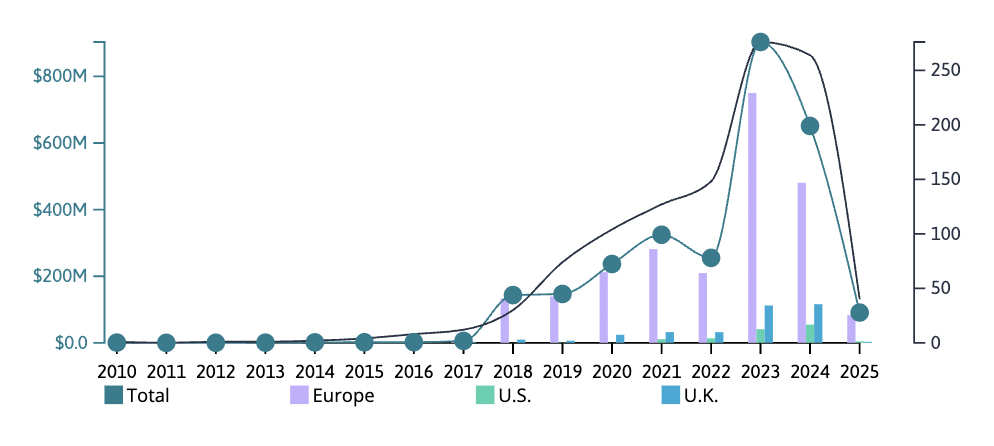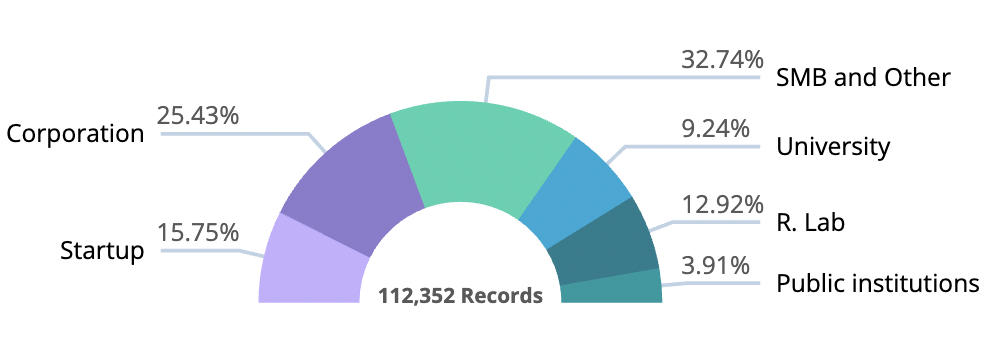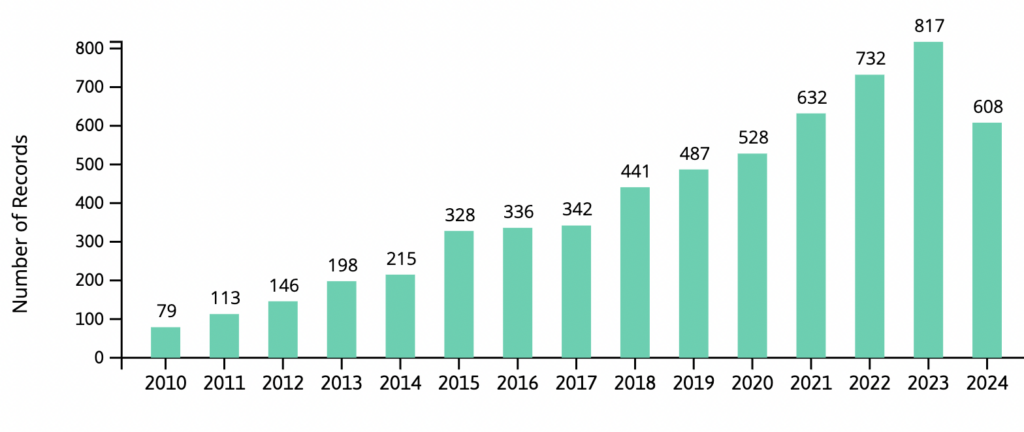The European Union’s Horizon Europe program is driving the next wave of deep tech innovation, supporting groundbreaking projects in artificial intelligence (AI), quantum computing, sustainable energy, advanced materials, and more. Discover a curated list of top Horizon projects and grants that are shaping the future of deeptech in Europe. All discovered with Linknovate’s innovation scouting tool InnoScout – including key insights in European public funding and innovative grants.
1. Quantum Flagship – Advancing the Quantum Era
Led by: VDI; CNSR; CEA; Technical University of Braunschweig; ICFO; TNO; CNR; Aarhus University; VTT
Funding: €6.6M (2022–2025)
Project link
Objective: One of Europe’s most ambitious quantum technology initiatives, the Quantum Flagship is dedicated to bringing quantum innovations from research to real-world applications. This project aims to:
- Develop quantum computing hardware and software to tackle complex problems beyond classical computing capabilities.
- Advance quantum cryptography and secure communication methods to protect sensitive data against cyber threats.
- Build quantum networks and quantum sensors that enhance precision in fields such as medical imaging, finance, and geophysics.
- Strengthen Europe’s role as a global leader in the quantum economy by fostering industry partnerships and spin-off startups.
2. MODERATOR – Immersion Cooling & Advanced Materials for Heat Recovery from Data Centers
Led by: CERTH; Hysytech; Sintef; Dreven; Ophiolite; Gerioson
Funding: €5.3M (2024-2027)
Project link
Objective: The MODERATOR project addresses the environmental impact of data centers by:
- Developing an immersion cooling system that enhances heat recovery.
- Creating a waste heat recovery (WHR) system using phase-change materials (PCMs) for efficient thermal energy storage.
- Integrating an automated prototype that combines a 40 kW immersion cooling system with a 500 kWh thermal energy storage system.
- Demonstrating the use of recovered thermal energy for space heating and electricity generation.
3. NGI Search – Next Generation Internet Discovery and Search
Led by: Linknovate, University of Aarhus, University of Murcia, FundingBox, OW2
Funding: € 8.5 million (2022-2025)
Project link
Objective: NGI Search is an ambitious project that is reimagining the way we search, discover, and access information online. It funds innovative, open-source search tools that prioritize user privacy, security, and transparency. The project fosters new search methodologies, including:
- Voice and image-based search interfaces
- Next-gen intelligent assistants
- Machine Learning and Natural Language Processing (NLP)
- Secure, neutral, and privacy-focused search environments
- Integration of heterogeneous data sources (IoT, social media, semantic data, websites, etc.)

By funding up to €150,000 per project and offering expert guidance, NGI Search is leading the way in reshaping the search experience.
Some of the innovative projects it has funded include confidential private search combining OpenSearch and confidential computing by CanaryBit; MindBugs Discovery, a visual search engine for tracking disinformation trends across Europe; and a decentralized search and discovery tool for the Fediverse by Mastodon.
If you’re curious about all the open source projects funded, you can check all the details on their NGI Searchers Booklet.
4. INFRACHIP – European Research Infrastructure on Semiconductor Chips
Led by: University College Cork; Demokritos; CNRS; UNINOVA; INL; Joanneum Research; Chalmers; AMO; Warsaw University of Technology; Minalogic
Funding: €14.4M (2024-2027)
Project link
Objective: the project aims to establish Europe’s first integrated, distributed research infrastructure for next-generation semiconductor chips. Key goals include:
- Mobilizing expert knowledge, state-of-the-art equipment, and capital investment to support sustainable semiconductor development.
- Advancing research in nanoelectronics, flexible electronics, and power-efficient IoT technologies.
- Supporting innovation through proof-of-concept studies, feasibility assessments, and new material exploration.
- Developing talent and training a skilled workforce through education programs and hands-on courses.
5. CRYSALIS – Cryogenic Storage and Refuelling in Space
Led by: Absolut System; The Exploration Company; University of Liège; Polytechnic University of Catalonia
Funding: €7.4 million (2024-2028)
Project link
Objective: CRYSALIS is developing cutting-edge technologies for managing cryogenic propellants, crucial for the next era of space transportation. Key aims include:
- Addressing environmental and safety concerns associated with traditional hydrazine propulsion systems.
- Advancing oxygen/methane cryogenic propellant technology for higher efficiency.
- Overcoming storage and transfer challenges posed by low saturation temperatures.
- Conducting in-orbit demonstrations aboard the Nyx capsule to validate performance in microgravity.
- Strengthening the EU’s independent access to space, supporting sustainable space exploration, and paving the way for manned missions to Mars and beyond.
6. TwinEU – Digital Twin for Europe
Led by: Fraunhofer; Ubitech Energy; Eng; European Dynamics; Technical University of Delft; ENEL; TEESlab; ETRA; ELES; BME; APG; E.DSO; ENTSO; Vito; ESO; Cintech Solutions; University of Cyprus; Artelys; RTE; Amprion; Envelio; RWTH Aachen; TU Dortmund; Westnetz; Hedno; ADMIE; RAAEY; Elke; F4ster; Areti; Enel X; EnSiEL; RSE; Terna; TenneT; INESC TEC; REN; Elektro Gorenjska; University of Ljubljana; Estabanell; CIRCE; Comillas Pontifical University; Cuerva Energia; REE; Polytechnic University of Bucharest;
Funding: €25.2 million (2024-2026)
Project link
Objective: TwinEU aims to develop digital twins for Europe’s energy infrastructure, allowing real-time simulation and optimization of power grids. The project focuses on:
- Creating a federated digital twin ecosystem for European energy operators.
- Developing AI-driven modeling tools for predictive energy management.
- Establishing a European data exchange framework for interoperability among energy systems.

7. SUNERGY – Future of Sustainable Solar Fuels & Energy
Led by: University of Utrecht; CEA; Ghent University; Leiden University; University of Warsaw; ICIQ; Siemens; DECHEMA; Fraunhofer; Carbyon; University of Turku; JH Institute; Uppsala University; Covestro; IMDEA Energy; Alma Digit; IMEC; Avantium; University of Bucharest; ArcelorMittal; Laborelec; Specialty Operations France
Funding: €4M (2022-2025)
Project link
Objective: SUNERGY is pioneering sustainable solar energy solutions, focusing on:
- Solar fuels: Developing innovative ways to store solar energy in chemical form for long-term energy storage.
- Hydrogen production: Advancing green hydrogen technologies to replace fossil fuels in transportation, industry, and power generation.
- CO2 conversion: Exploring methods to capture and convert CO2 into valuable fuels and materials, contributing to the fight against climate change.
- Scaling up clean energy technologies to enable widespread adoption and commercialization of solar-driven energy systems.
8. Minority Report – People-Centric Predictive Digital Technologies for Disaster and Climate Resilience
Led by: IES R&D; Stam; Demo; B-kode; Trinity College Dublin; University of Canterbury; University of Auckland; University of Patras; Prospex Institute; La Sia; E2Arc; Wellington City Council; Dublin City Council; PDE
Funding: €5.3 million (2024-2027)
Project link
Objective: Minority Report focuses on leveraging AI-driven predictive technologies to improve urban resilience against climate change and natural disasters.
- Integration of digital twins, BIM, and AI models for enhanced risk assessment and disaster prediction.
- Advanced monitoring systems to support early warning and emergency response.
- Circular construction approaches to reduce carbon footprint and enhance building resilience.

9. ATHENA – Advanced Imaging Technologies for High-Value Applications
Led by: CEA; Lynred; ST Grenoble; Polytechnic University of Catalonia; Zeiss; TUSAS; Sensia Solutions; Idemia; Tobii; Catuav; Youbiquo; IFAE; Silicon Austria Labs; Magna Electronics; ISD; Umicore
Funding: €39.5 million (2024-2027)
Project link
Objective: ATHENA aims to strengthen Europe’s high-tech imaging economy by leveraging 3D stacking technologies and improved sensor-processing integration for advanced imaging functionalities.
- The project focuses on long-wave infrared (LWIR) and very long-wave infrared (VLWIR) imagers for various applications.
- ATHENA will facilitate the development of cost-effective LWIR wafer-level optics and prepare µbolometer manufacturing for scalability.
- The project aims to enhance industrial competitiveness in imaging technologies for sectors like automotive, health, and environmental monitoring.

10. DIAMETER – Demonstration of a Sustainable Circular-by-Design Manufacturing System Based on Additive Manufacturing
Led by: Sabanci University; KTH; Fraunhofer; University of Sheffield; CARTIF; Moduleworks; Stratagem Energy; F3nice; Trentino Sviluppo; Valcun; TUSAS; Valland; Coşkunöz Kalıp Makina
Funding: €6 million (2024–2028)
Project link
Objective: DIAMETER aims to transition the metal manufacturing sector into a circular economy. The project will combine additive manufacturing with digital tools to optimize processes and reduce ecological and economic impacts.
- The project will develop AI-assisted algorithms to assess sustainability and integrate platforms to encourage industry adoption.
- Two platforms, DIAgonal and DIAdemia, will be used for improving ecological impact estimation and supporting workforce upskilling through interactive training courses.
Conclusion
Horizon Europe is driving the future of deep tech innovation, funding projects that are transforming industries and addressing global challenges. From NGI Search and Quantum Flagship to DIAMETER, these projects are reshaping digital landscapes, energy systems, AI advancements, and more. Europe is solidifying its leadership in AI, quantum computing, and sustainable technologies, creating a smarter, more sustainable future.
To explore key EU and international grants for innovative projects, start a free trial of our innovation scouting platform or book a demo with us to check together what you’re looking for.





